Quick Summary:
Finding the right Salesforce Managed Service Provider is challenging. You need a reliable Salesforce partner that can provide you with all the infrastructural, talent, experience & other support to fulfill your requirements seamlessly. We have lined up a special blog on ‘Questions you should ask potential Salesforce Managed Service Providers’ that you should refer to before finalizing any provider. Let’s get right into it:
In today’s dynamic business landscape, companies must harness the full potential of the Salesforce ecosystem to optimize their customer relationship management processes & streamline their business operations. Hence, choosing a reliable Salesforce Managed Service Provider that knows how to properly implement, customize, configure, design & deploy your Salesforce project to your existing ecosystem is very important.
But before we understand what to ask Salesforce Managed Service Providers to assess their skills, we must first understand Why we need a Salesforce Managed Service Provider in the first place.
Understanding Your Salesforce Requirements Before Finding a Salesforce MSP Partner
This is always the ideal place to start before finding the best Salesforce development company for your project. Knowing exactly what you’re looking for will help you narrow down your options and better assess the shortlisted Salesforce companies for their offerings and quality.
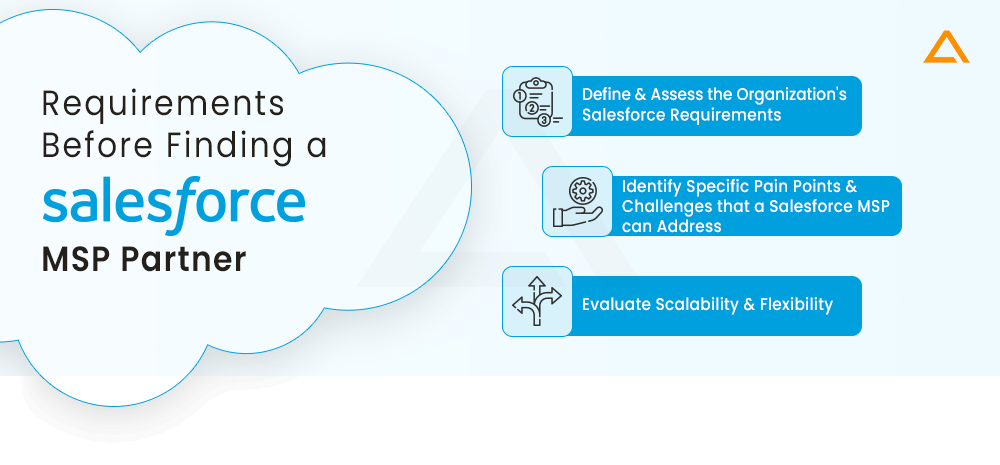
How do I conduct a self-Salesforce requirement analysis? We’re glad you asked!
A. Define and Assess the Organization’s Salesforce Requirements
Consider the various aspects impacting the kind of Salesforce implementation services you require. Here are the various factors you can consider:
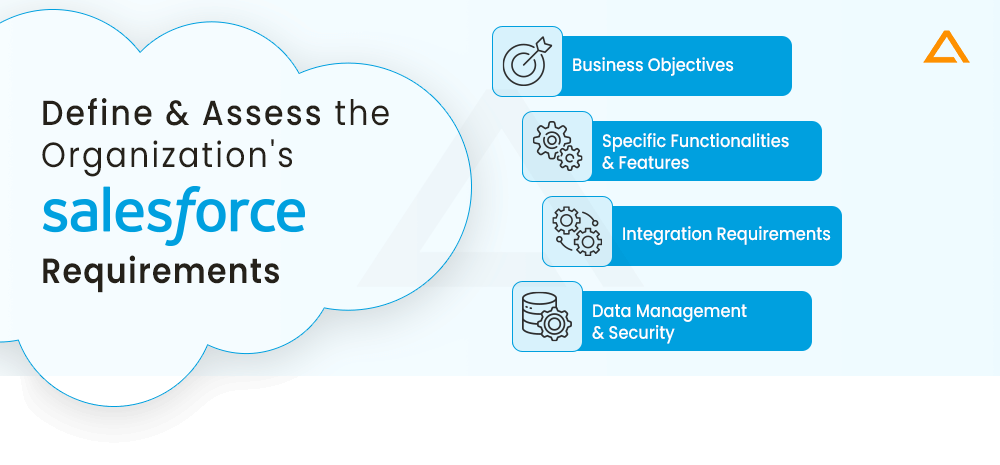
Business Objectives
- Clearly articulate short-term & long-term business goals
- Identify how Salesforce can contribute towards these goals, whether through sales optimization, enhanced customer service, or marketing automation
Specific Functionalities & Features
- Next, list all the necessary features to carry out your business processes
- Prioritize functionalities like opportunity tracking, lead management, customer communication, analytics & more
Integration Requirements
- Identify existing systems and applications that need to be integrated with Salesforce
- Assess the level of integration required for smooth data flow across your organization
Data Management & Security
- Define data management policies like data storage requirements, access controls & security measures
- Consider necessary compliance requirements related to your industry & ensure your Salesforce Managed Service Provider knows how to comply with these standards
B. Identify Specific Pain Points & Challenges that a Salesforce MSP can Address
Now that you have a better idea of your purpose in getting Salesforce services, you will also discover the possible challenges and pain points that an effective Salesforce MSP service provider can help you overcome. Some of the common challenges our clients discuss are:
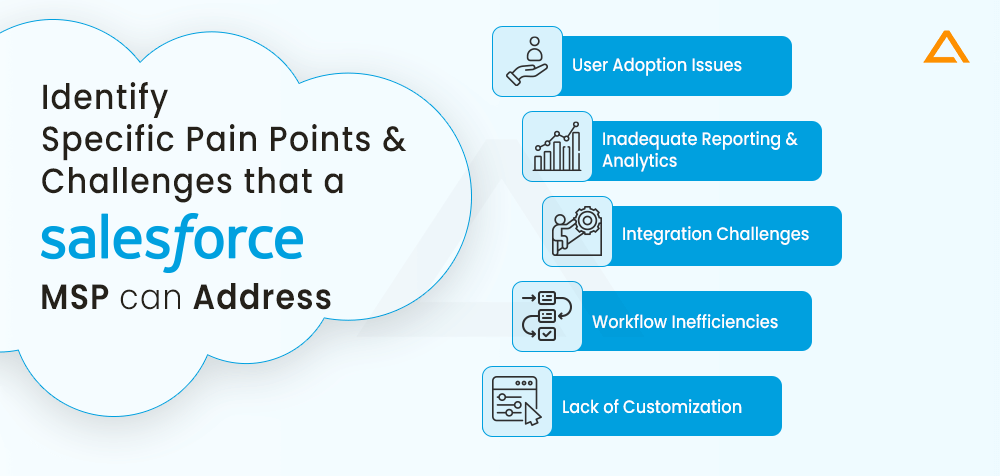
User Adoption Issues
- Evaluate if there could be any issues with your users adapting to the Salesforce Platform
- Identify the possible reasons for the resistance & determine strategies to overcome them
Inadequate Reporting & Analytics
- Pinpoint shortcomings in your current reporting & analytic processes
- Identify specific data points & insights that are missing or challenging to extract
Integration Challenges
- Identify any issues with data synchronization & integration with other systems
- Determine where interruptions could occur in the data flow of your processes
Workflow Inefficiencies
- Assess the efficiency of your current workflow & identify potential bottlenecks
- Determine if any repetitive tasks can be automated to improve productivity
Lack of Customization
- If you have a current Salesforce implementation, identify areas lacking customization to meet specific business needs
- Determine if certain processes can still be streamlined with tailored Salesforce solutions
C. Evaluate Scalability & Flexibility
Last, you must prepare for the growth you will experience in the coming years. When planning its growth strategy, a business must be prepared to handle the influx of data, processes, new user enrollments, database management, and other important aspects. This will help you select the right Salesforce MSP provider with enough capabilities to match your requirements. Consider things like:
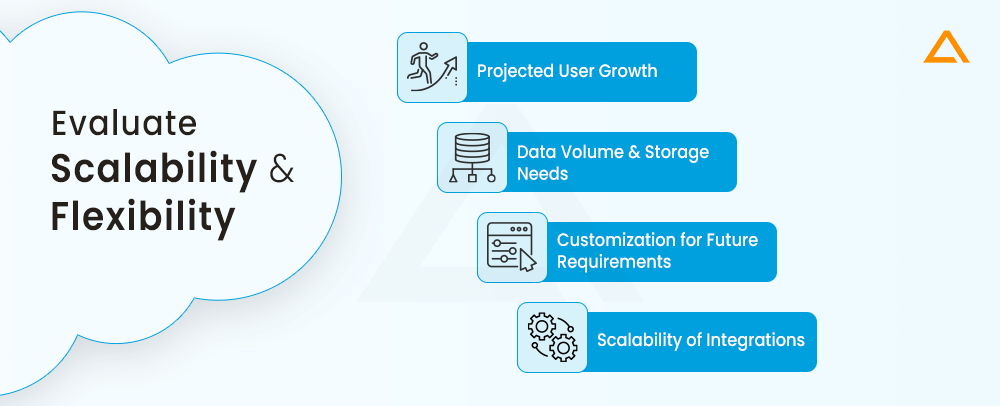
Projected User Growth
- Estimate the growth in the number of users interacting with Salesforce
- Assess whether the current Salesforce configuration can accommodate this growth
Data Volume & Storage Needs
- Anticipate the increase in data volume over time
- Ensure your Salesforce Implementation Partner can handle expanding data needs without compromising performance
Customization for Future Requirements
- Evaluate the potential need for additional features or functionalities in the future
- Assess whether the current Salesforce implementation aligns with your organization’s tech strategy
Scalability of Integrations
- Evaluate the scalability capabilities of integrations with other systems
- Ensure the integrations are flexible & scalable to grow with your organizational growth

Searching for IT Superstars?
We’ve Got You Covered!
Choose Aglowid as your premier Salesforce Development partner for guaranteed project success.
Questions to Ask Potential Salesforce Managed Service Providers
Let’s get right into it. Here are the most important questions to ask your Salesforce Managed Service Providers before finalizing them as your Salesforce partner for your project:
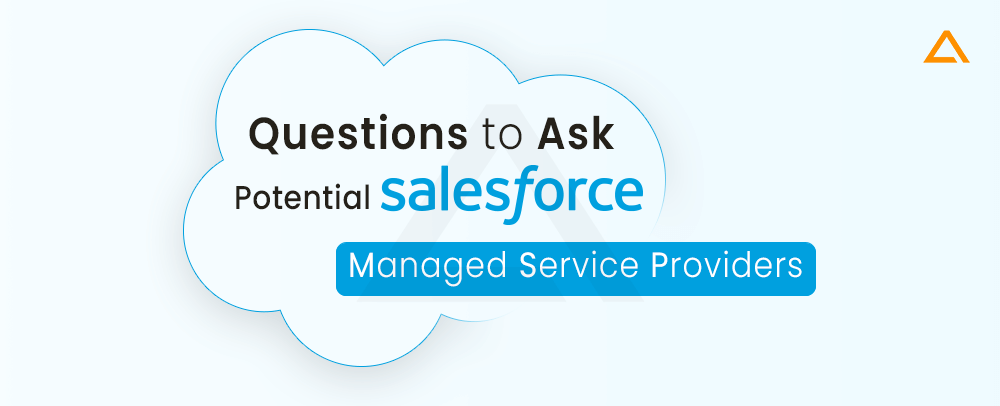
Q1. What is your experience with providing Salesforce Managed Solutions?
The first question to ask naturally should be about their experience with the Salesforce ecosystem and expertise in providing custom Salesforce-managed solutions to different clients. Proven experience reassures you as a C-level executive or important decision maker of your company of the quality & ability to deliver your chosen Salesforce MSP.
Why is it important to know this?
Experience brings a lot of added advantages to the table, whether it’s in terms of expertise, reliability, or other such factors like problem-solving skills, adherence to industrial best practices, certifications & qualifications, in-depth knowledge, and faster project implementation.
How to gauge the Salesforce Managed Solution Provider’s experience?
To gauge their true understanding and experience with the Salesforce platform, ask them questions such as:
- Are you a certified Salesforce Partner?
- What certifications in Salesforce does your company hold?
- Can you provide me with references for past projects similar to my niche?
Q2. What services do you cover as a Managed Salesforce Partner?
Understanding the service offerings of the potential Managed Salesforce Partner is crucial to ensure the successful implementation of your Salesforce project. It helps ensure the MSP’s skills and capabilities align with your organization’s needs. Generally, opt for a Salesforce Partner that covers all important aspects of a successful Salesforce implementation, such as implementation, customization, integrations, administration, support & training.
Why is it important to know this?
Any Salesforce Managed Service Provider providing comprehensive solutions can address your short-term and long-term needs, contributing to a sustainable and future-proof Salesforce implementation.
How to gauge the Salesforce MSP for the services offered?
- Implementation: How do we ensure a smooth Salesforce implementation?
- Customization: Can you provide any examples of tailored solutions for specific problems?
- Integration: What’s your experience in seamlessly integrating Salesforce with other systems?
- Administrative Support: How do you provide ongoing administrative support?
- Training Programs: Do you offer comprehensive training for users & administrators?
- Support Models: What’s the strength of your Salesforce service staff? Do you offer flexible support models?
- Scalability: How do you ensure the scalability of your Salesforce solutions for future growth?
- Strategic Guidance: How do you provide strategic advice aligning Salesforce with business objectives?
Q3. How do you define your Service Level Agreements, particularly in terms of response time, issue resolution, and system uptime?
SLAs – Service Level Agreements are the backbone of any successful parentship with a Managed Salesforce Partner. Understanding how your shortlisted MSPs define and commit to their SLAs is important for managing expectations, ensuring timely support, and maintaining optimal system performance.
Why is it important to know this?
SLAs provide a proper overview of a Salesforce Partner’s capabilities, approach, and style of working, which can help you set realistic expectations and ensure that they can meet your organization’s needs. Response time, system uptime, and issue resolution directly impact the reliability of your Salesforce implementation.
How to gauge the Salesforce MSP for SLAs?
- What is your guaranteed response time for support requests or issue resolutions?
- How do you approach issue resolution, and what is the typical turnaround time?
- Can you specify the guaranteed system uptime? How do you handle downtimes?
- What is the escalation process for critical issues that need immediate attention?
- How do you prefer to communicate updates/support requests/system issues?
- How do you monitor and ensure the ongoing performance of our Salesforce system?
- What are the penalties for not meeting agreed-upon service levels in the SLA?
Q4. How does your Managed Service ensure Salesforce data protection and compliance with industry standards?
When choosing a Salesforce Managed Service Provider, data protection and Salesforce security best practices standards must be considered. Salesforce is a cornerstone of CRM, one of the most trusted and reliable platforms. Hence, it demands robust measures to safeguard sensitive information. It would help if you had an MSP who knows the configurations and Salesforce Customization Services needed with the right Salesforce tools and processes to ensure the highest possible data protection and compliance adherence.
Why is it important to know this?
Understanding the approach your Salesforce Managed Service Provider takes for tackling data protection challenges ensures your business-critical information’s confidentiality, reliability, availability, and integrity. Compliance adherence mitigates risks without compromising your software’s capabilities.
How to gauge the Salesforce MSP for Data Protection & Compliance?
- What security protocols are in place for safeguarding Salesforce data?
- How is data encrypted in transit and rest within the Salesforce environment?
- Can you elaborate on the access controls implemented to ensure only authorized personnel can access sensitive data?
- How are audit trails maintained? Also, can you provide insights into how data is accessed and modified?
- How does your service ensure compliance with industry standards like GDPR, HIPAA & other regulations?
- What is your incident response plan if there is a security breach?
Q5. What is the pricing structure flexibility & transparency to avail your Salesforce Management Services?
Picking a Salesforce Managed Service Provider based on the lowest rates is never a good idea. As a C-level executive or decision maker for your company, you need to focus on two aspects – financial optimization based on ROI & flexibility of pricing plans. Every Salesforce implementation is unique, and your requirements for Salesforce services may evolve over time. Hence, you need flexibility in the pricing plans to ensure you only pay for what you use and don’t need to jump ships due to the rigidity of pricing plans.
Why is it important to know this?
Pricing flexibility shows the commitment and capability of your Salesforce MSP in delivering custom Salesforce solutions. A transparent pricing structure fosters a healthy client-provider relationship, minimizing unexpected costs. Proper information about pricing models offered by the MSP upfront enables better financial planning, allowing you to invest wisely in Salesforce services.
How to gauge the Salesforce MSP for Pricing Structure Flexibility & Transparency?
- Do you offer both Fixed-Fee Project and Times-and-Material pricing options?
- How do you calculate your ongoing support prices? And is it adjustable?
- How does the pricing structure accommodate scalability as our organization grows?
- Is there a separate pricing model for customizations?
- Are the training and additional services priced separately?
- What are the contract terms, and can the terms be adjusted as per changing circumstances?
- Are there any potential hidden costs that may arise during the tenure of our engagement?
- Can the payment schedule be aligned with our financial cycles?
Q6. How do you manage Salesforce Platform Updates & Change Management?
Understanding how a Managed Salesforce Service Provider handles platform updates is important to ensure your Salesforce experience is always up-to-date. Not knowing how to keep up with these platform updates can make your Salesforce project obsolete, susceptible to exploitation, and in user abandonment.
Why is it important to know this?
Salesforce regularly releases updates with new features and changes to enhance functionality and security. It may discontinue some of its services, too, which must be considered to ensure your Salesforce application doesn’t break due to such a dependency. The role of a Salesforce MSP is to allow your organization to reap the benefits of the latest advancements without disruptions.
How to gauge the Salesforce MSP for Platform Updates & Change Management?
- How do you assess the impact of Salesforce updates on existing configurations & customizations?
- Can you outline your release management process from testing to final deployment?
- What testing protocols do you have to ensure our Salesforce instance remains functional after updates?
- How do you communicate upcoming Salesforce targets and changes to our team?
- What are the rollback procedures in situations of running into unexpected issues?
Q7. What talents do you have in your Salesforce Team?
In the end, it’s the Salesforce team working on your project and their capabilities that will determine the success or failure of your project. Moreover, Salesforce is a wide ecosystem with many features, functionalities, and services. Hence, knowing if the Salesforce Managed Service Provider has the right talents to fulfill your particular requirements is important.
Why is it important to know this?
If you have frequent Salesforce projects or tasks that need to be worked on, you would need different Salesforce talents, such as developers, consultants, engineers, architects, and designers, to work on such specific projects. You should be able to build your custom Salesforce team to get the best results for your Salesforce needs.
- How to gauge the Salesforce MSP for Salesforce Team Talents?
- How many certifications does your team collectively have?
- What is the overall experience range of Salesforce developers in your team?
- Are they team members with specialized skills that align with my project or niche?
- How does the team stay updated with the latest Salesforce features & best practices?
- Do you provide dedicated Salesforce Staff Augmentation Services?
- Can the team scale to meet the growing demands of our organization’s Salesforce needs?
Characteristics of a Professional Salesforce Managed Service Provider Like Aglowid
We have you covered if you want a quick Salesforce Managed Service Provider Selection Checklist. Here are the traits of a professional Salesforce MSP you should look for:
- Successful history of managing and implementing Salesforce projects
- 360 Salesforce Service Offerings – Implementation, Customization, Development, AppExchange Development, Application Development, Integration, CPQ, Customization & more
- Transparent pricing structure with flexibility for accommodating different organization’s requirements
- Prioritizes and implements robust security measures
- Deeply experienced in the Salesforce ecosystem
- Offering strategic advice to align Salesforce with overall business objectives
- Certified Salesforce Partner listed on Salesforce AppExchange Platform
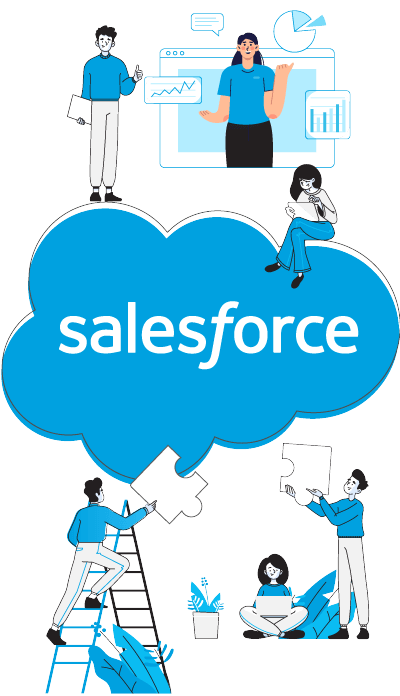
Looking to Hire Salesforce Developers?
Consider it Done!
Secure Project Success by Hiring a Salesforce Developer from Aglowid.
Wrapping Up!
You should ask These important questions before selecting a Salesforce-managed service provider. Such questions can form a strong foundation for a meaningful and strategic partnership that can benefit you immensely in the long run. Make the most of the Salesforce platform by partnering with a capable partner like Aglowid!
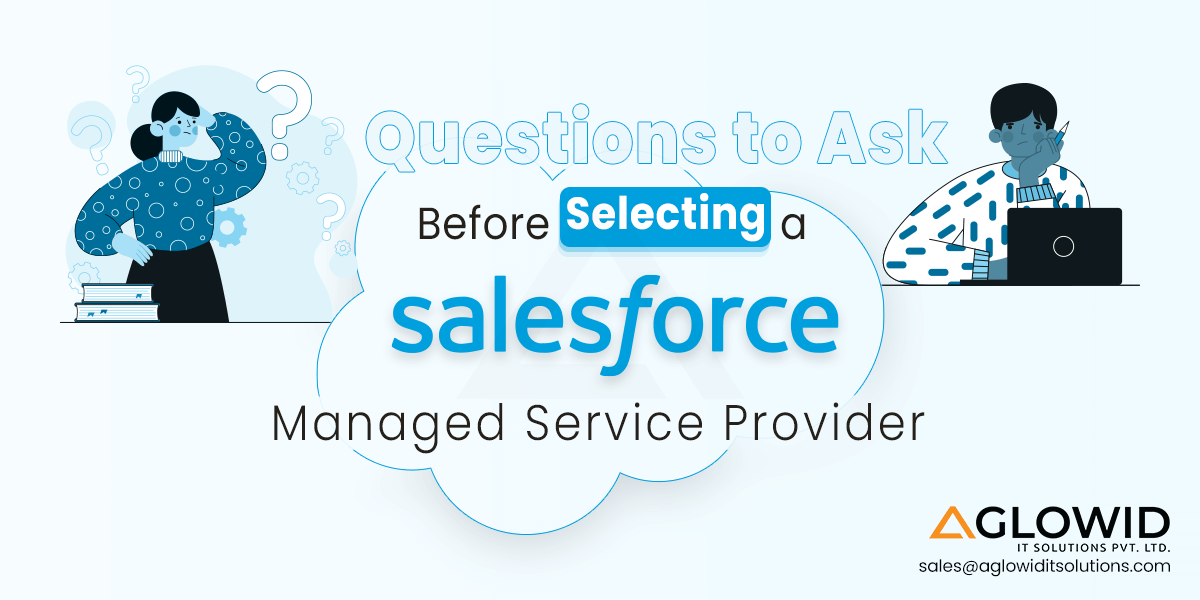




 Say
Say